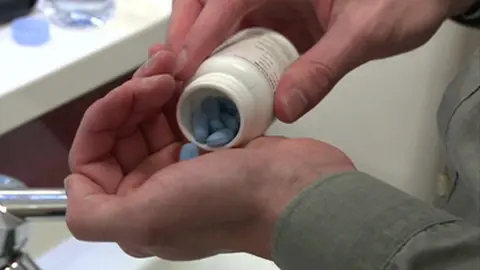Battle against HIV in London 'needs scaling up'
 BBC
BBCLondon's battle against HIV will need to be stepped up to meet the goal of ending new transmission by the end of the decade, the mayor's health adviser has warned.
Prof Kevin Fenton, who is Sir Sadiq Khan's statutory health adviser, told the London Assembly testing and treatment for the virus needs "strengthening and scaling [up]".
Although HIV diagnoses have roughly halved in the last eight years, Prof Fenton said this may make it "harder to identify people" diagnosed or living with HIV.
Speaking at a meeting of the Assembly's health committee as part of its investigation into the spread of HIV in London, he said new patterns of transmission were also emerging.
The warning comes after the mayor signed the Paris Declaration on Fast-Track Cities Ending the HIV Epidemic in 2018, with an aim for the capital to have zero new cases of HIV, preventable deaths and stigma by 2030.
According to the Local Democracy Reporting Service, the latest data shows a total of 980 people were diagnosed with HIV for the first time in London in 2023, of whom 691 were men and 288 women. Eight years before that, in 2015, the overall figure was about twice as high – at 1,977.
A further 563 people in London were also confirmed as having HIV in 2023 after being diagnosed with the virus abroad - roughly the same number as in 2015.
 PA Media
PA MediaProf Fenton said the last four decades have seen "remarkable" improvements in preventing and detecting HIV and support, but ending transmission "will be challenging for a number of reasons".
"As new infections decline, we can expect to see [that] the people who do acquire HIV are more likely to have complex lives," he said.
"They may be having higher levels of risk behaviours. They may be poorly engaged with existing treatment and care services. They may be dealing with many of the social and structural drivers of transmission, including poverty, insecure immigration status and other key structural factors.
"It means that what got us to this point will not be sufficient to get us to 2030."
Among his suggestions for further reducing transmission were scaling up testing and expanding access to and use of Pre-Exposure Prophylaxis (PrEP), a drug which stops HIV infecting the body.
He also told assembly members migration patterns had affected the prevalence of HIV among different London communities.
"The most recent increase in infections, acquired through heterosexual intercourse - especially black people from high prevalence countries in sub-Saharan Africa - has been a key feature," he explained.
Prof Fenton added health advisers believe the rise is due to migration to the UK, but stressed "those who've been diagnosed in the past year have evidence of being on effective treatment, and have been virally suppressed... and therefore at low risk of transmitting infection to others".
Listen to the best of BBC Radio London on Sounds and follow BBC London on Facebook, X and Instagram. Send your story ideas to [email protected]
